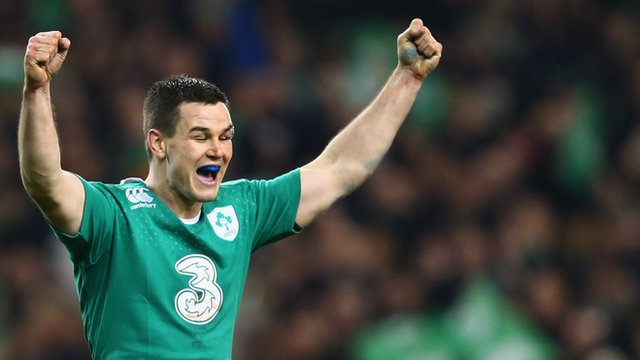England’s oldest surviving player, Harry Walker, celebrated his 100th birthday last week. His verdict on modern rugby? “It’s a different game. I don’t like it.”
Valentine’s Day at the Aviva Stadium on Saturday was a massacre. Of the senses. If you were out for romance in Dublin, you steered clear of Lansdowne Road.
Ireland made not a single line break and produced two offloads in 80 minutes. France, once proud bastions of romantic rugby, were like orcs, shaved down and poured into shirts and shorts. It was ugly. Albeit compelling.
Judging by the reaction on social media, this is what many modern rugby fans want – hits, collisions, blitzkrieg. And this is what modern rugby is, at least at Test level – wars of attrition, fought with tanks and howitzers rather than epees.
“There is no room for finesse any more,” says Harry Walker. “If you beat one man then three others hit you.”
Walker – a former prop – reckons the last bit of guile he saw on a rugby field came from Ireland’s Brian O’Driscoll, three years ago. “A body swerve, a dummy and his winger was in.” O’Driscoll, who only retired last year, already seems like some mythical legend of a more innocent bygone age.
Sexton the brave
Given the demands of modern Test rugby, the performance of Ireland fly-half Jonathan Sexton against France bordered on a miracle. The Racing Metro number 10 had not played for three months owing to a succession of concussions. Not so much diving into the deep end as into a bubbling cauldron.
Conducting Ireland against the gigantic French in front of 50,000 hopeful fans must be like conducting an orchestra on a rollercoaster. But in the first half Sexton was majestic, his kicking varied and for the most part accurate.
France coach Philippe Saint-Andre suggested Sexton would be targeted by the beast that is Mathieu Bastareaud. What we didn’t expect was for Sexton to go hunting for the beast. Even more impressive than Sexton’s kicking – he also knocked over five penalties – was his tackle on the 18-stone centre Bastareaud in the second minute. And stood against him, to think again. Wrong anthem, right sentiment.
In Ireland’s defence
Sexton wasn’t the only Irishman fronting up at the Aviva Stadium. Ireland made 143 tackles to France’s 88. They also brought about nine turnovers to France’s four. These are the sorts of statistics that turn the modern rugby fan on.
Take the numbers away and the sight of it was stirring. When France beefed up their pack in the second half, there were suddenly more pumps than Ireland had hands. Clermont prop Vincent Debaty, all 20 stone of him, is not a man you want to scrum against with 50 minutes of play already in your lungs and legs.
But Ireland’s defence was tremendous. Centre Robbie Henshaw was heroic in the face of Bastareaud and the more guileful Wesley Fofana, making 15 tackles. And Sean O’Brien, back in the team after a shoulder reconstruction, was only one tackle behind. “I was blowing, sucking in air,” said the Leinster flanker. Against England in two weeks’ time, O’Brien will be crucial to Ireland’s plans.
A win is a win
Joe Schmidt’s Ireland have now won nine Tests in a row. No wonder Sir Clive Woodward, who coached England to World Cup glory in 2003, reckons the New Zealander is the best coach in international rugby.
There is something quite Woodwardian about Schmidt’s methods. With Leinster, Schmidt won two Heineken Cups playing sometimes expansive rugby. But Schmidt is intelligent enough to know that international rugby is about achieving the win at all costs.
Woodward’s England could play when they wanted to – but they were simply magnificent at grinding out results.
If Ireland hope to be contenders at the World Cup this autumn they will need to show more creativity and be more penetrative behind the scrum. The success of the All Blacks is their remorseless proficiency combined with the odd flash of genius. Whether Schmidt has that genius at his disposal remains to be seen.
Poor Saint-Andre
In the 1990 French championship final, Racing Metro played in pink bow ties. At half-time they supped champagne. They won. It was a protest, against the onset of professionalism and all the functionality and seriousness that entailed.
Jean-Baptiste Lafond, the France winger who inspired such stunts, lost the battle – Racing Metro are as functional as any club side in world rugby and the national team even more so. Saint-Andre’s France are absolutely brutal.
Lafond was part of that famous, length-of-the-field French try at Twickenham in 1991, which was finished off by Saint-Andre. Who would have thought back then that Saint-Andre would be responsible for snuffing out the last vestiges of Gallic flair? God only knows what Lafond thinks of this current French team.
Saint-Andre’s 45% winning record might be almost acceptable if his sides played attractive rugby. But owing to inconsistent selection, an obsession with size and a lack of any obvious game-plan, his sides are invariably a mess.






















